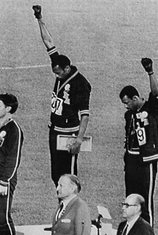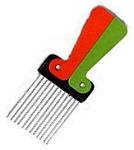Found a great new blog (new to me anyway) called "postbourgie". Lots of great stuff over there, including this analysis of Malcolm Lee's films. I think this blog is gonna give me a run for my money on the movie front:
Malcolm D. Lee, Cinematic Chameleon
 When Malcolm D. Lee arrived on the cinematic scene with 1999’s The Best Man, audiences marked his arrival by awarding him 34,074,900 of their hard-earned movie-going dollars over the course of the film’s run. A respectable showing for any debut film, this gross afforded Lee a bit of clout coming out of the gate. Perhaps it was timing. The Best Man opened two years after Theodore Witcher’s Love Jones (another film that featured artsy, middle-class black folks and Nia Long as the star-crossed object of some writer’s affection). Audiences had been primed for the emergence of yet another African American film subgenre (hot on the heels of the fizzling “gangsta/hood film” niche) and it seemed that bohemian-swanky Black films were the natural forerunner.
When Malcolm D. Lee arrived on the cinematic scene with 1999’s The Best Man, audiences marked his arrival by awarding him 34,074,900 of their hard-earned movie-going dollars over the course of the film’s run. A respectable showing for any debut film, this gross afforded Lee a bit of clout coming out of the gate. Perhaps it was timing. The Best Man opened two years after Theodore Witcher’s Love Jones (another film that featured artsy, middle-class black folks and Nia Long as the star-crossed object of some writer’s affection). Audiences had been primed for the emergence of yet another African American film subgenre (hot on the heels of the fizzling “gangsta/hood film” niche) and it seemed that bohemian-swanky Black films were the natural forerunner.Or maybe Lee’s PR were responsible for The Best Man’s decent debut, with their dogged insistence on letting everyone know that—funny we should ask, but yes—Malcolm D. Lee is related to Spike Lee; they’re cousins! Interesting little tidbit, that. Spike had been a part of Black American filmgoers’ consciousness since 1986, when She’s Gotta Have It hit the screen. We knew him; he’d given us intense, complicated, poignant, and sometimes baffling cinema for thirteen years before his cousin cropped up. Linking Spike and Malcolm as relatives undoubtedly set up some firm, if unvoiced, expectations. And knowing that Spike’s 40 Acres and a Mule Filmworks helped bring The Best Man to fruition only solidified those ideas.
Whatever the cause of the film’s gross, after viewing it, we had to reassess whatever presumptions we’d formed regarding Malcolm’s similarity to Spike. Malcolm, it seemed, had a lighter touch. He wasn’t as heavy-handed or “Message!”-driven as his cousin. His treatment of women was just as confounding as his cousin’s, but he also seemed willing to give them a bit more to do onscreen. And his sense of humor was firmly in tact–the film’s jokes weren’t as smarmy or tongue-in-cheek as those of, say, Giant character’s in Mo’ Better Blues.
In short: Malcolm D. Lee was broader than Spike. He was more accessible. For anyone who was starting to find Spike’s work a little pretentious, here was a revised Lee model–now with 50% less Agenda!
Three years passed before Lee ventured a sophomore project. His offering: Undercover Brother, a Blaxploitation parody of sorts that saw Eddie Griffin as the titular secret agent, angling to keep The Man from achieving world domination. Perhaps you remember it?

It involved the notoriously awful Denise Richards as a rival agent, who puts the moves on the afroed, fist-raising militant and temporarily subdues him with her assimilating influence. It wasn’t awful. And it certainly was unlike anything we’d seen since I’m Gonna Get You Sucka (the Blaxploitation parody film to end them all, really). But it also threw us off our mark a bit.
Here we were, thinking Malcolm D. Lee would be bringing us a filmography full of straightforwardly upscale African American characters in various states of romantic and professional unrest. And then he follows himself up with a parody film. Hmm. Black parodies are rare and successful executions of black parodies are even rarer. We admired his pluck for attempting to tap into that market–and his business acumen; Undercover Brother grossed $38,230,435. But we still wondered where he was going.
 In 2005, we’d find out, when Roll Bounce opened. A period dramedy about competitive preteen/teen roller-skating wars in the ’70s—with Shad “Bow Wow” Morris at the fore, Roll Bounce marked Lee’s first commercial disappointment. Its opening weekend gross was only $7,570,366. The film would go on to make $17,378,977, halfing the overall earnings of The Best Man. To add insult to injury, ATL would open a year later, tackling similar subject matter with older characters, better writing/acting, and superior box office results ($21,160,089). Even so, Roll Bounce was yet another intriguing turn for the Georgetown-educated Lee, whose work kept refusing to fit into any set Black film mold.
In 2005, we’d find out, when Roll Bounce opened. A period dramedy about competitive preteen/teen roller-skating wars in the ’70s—with Shad “Bow Wow” Morris at the fore, Roll Bounce marked Lee’s first commercial disappointment. Its opening weekend gross was only $7,570,366. The film would go on to make $17,378,977, halfing the overall earnings of The Best Man. To add insult to injury, ATL would open a year later, tackling similar subject matter with older characters, better writing/acting, and superior box office results ($21,160,089). Even so, Roll Bounce was yet another intriguing turn for the Georgetown-educated Lee, whose work kept refusing to fit into any set Black film mold.We didn’t know what would be next from him—whether it would be innocuously watchable like The Best Man, cornily eye-roll inducing (even as it elicited involuntary chuckles) like Undercover Brother or fraught with bad acting and a weak plot like Roll Bounce. But we knew that, at the very least, it’d be interesting and unexpected.
In keeping with his every-three-years trend, Malcolm D. Lee has unveils his latest project this weekend. We know what you’re thinking, “Wait. I haven’t heard anything about an interesting Black film opening today….” And you’re right. There isn’t an interesting Black film opening today. But you know what is hitting screens this weekend?
 Welcome Home, Roscoe Jenkins.
Welcome Home, Roscoe Jenkins.Of all the places Malcolm D. Lee has taken us during his relatively short career, the terrain of the broad, slapstick Black comedy hasn’t been one of them. Until now. No matter where we imagined Lee would take us next, it’s likely we didn’t expect a “You done forgot where you caaame from!”/”Mah-muuuuh!” kind of flick with Mo’Nique prominently featured in the trailer. In fact, in a September 2005 interview with Blackfilm.com, Lee stated that films fusing drama and comedy for realism’s sake are “the types of films he likes to make.”
We’re not saying that a broad/slapstick comedy can’t have effectively poignant moments. We’re just saying that in perusing early reviews, Welcome Home, Roscoe Jenkins reeeeally doesn’t. It’s too bad, too, because this is a premise we would’ve expected Lee to do a bit more with. Hometown boy makes good, then grudgingly comes home and finds himself unexpectedly humbled and awed by his roots. It’s an age-old tale (and terribly cliche), but it could’ve been well-executed. Instead it went for skunk-spraying and baseballs to the head of the grey-haired matriarch and, well, Mo’Nique’s typically unfunny punch lines.
So we have to wonder: is he just doing this to recoup some of his monetary losses (if any) from the Roll Bounce flop? Is this a quick way to gain a little revenue to pour into his next film, Soul Men? Soul Men sounds like a return to form (if any pattern can be found in Lee’s work thus far), as it will see Samuel L. Jackson and Bernie Mac play two estranged ’70s band members, grudgingly uniting at the Apollo for a tribute show for their deceased bandleader.
Here’s hoping this Roscoe Jenkins thing was just a glitch in Malcolm’s Matrix.











 RSS Feed (xml)
RSS Feed (xml)


























5 comments:
I have not see, nor have planned to see either of these film. I don't know if they were good, bad or indifferent. However, they were advertised as such slapstick farce that I was turned off long before they hit the theatre. Not my type of cinema.
I don't know how big of a run for the money "Postbourgie" can give you, because you have created a wonderful venue for your cyber friends. It's not easy to do that.
That's "seen"
Thanks for sayoing so Shelia...I was kinda kiddin' about the "run for my money" part, but it is a very good blog.
People that have actually seen Roscoe Jenkins have told me that they thought it was good, and really enjoyed it. Guess that means I'll have to go see it...
The Best Man and Roll, Bounce were valiant efforts I thought.
Ooooops! Let me correct that, I thought that The Best Man was great! It was very well done, captured the theme wonderfully.
I've also heard that about Roscoe Jenkins, but the preview looks so more of the same! If I hear that it's good a few more times I may give it a chance.
I don't go on someone saying that it's funny, because my idea of funny and someone that likes seeing people being hit over the head or poked in the eye, vastly differs.
But I've actually heard good, and that's a recommendation for me.
If Roscoe is not good, we'll always have The Best Man (even if Taye Diggs is in it :-( )
Post a Comment